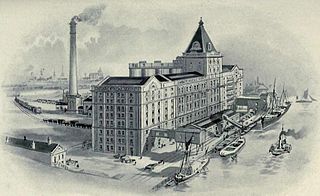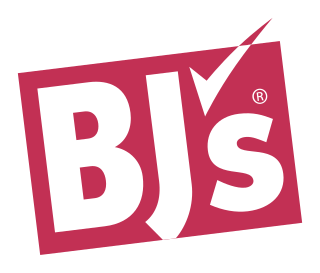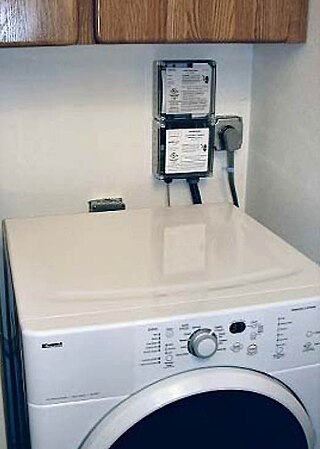Related Research Articles

The Federal Energy Regulatory Commission (FERC) is the United States federal agency that regulates the transmission and wholesale sale of electricity and natural gas in interstate commerce and regulates the transportation of oil by pipeline in interstate commerce. FERC also reviews proposals to build interstate natural gas pipelines, natural gas storage projects, and liquefied natural gas (LNG) terminals, in addition to licensing non-federal hydropower projects.

Wholesaling or distributing is the sale of goods or merchandise to retailers; to industrial, commercial, institutional or other professional business users; or to other wholesalers and related subordinated services. In general, it is the sale of goods in bulk to anyone, either a person or an organization, other than the end consumer of that merchandise. Wholesaling is buying goods in bulk quantity, usually directly from the manufacture or source, at a discounted rate. The retailer then sells the goods to the end consumer at a higher price making a profit.
In a broad sense, an electricity market is a system that facilitates the exchange of electricity-related goods and services. During more than a century of evolution of the electric power industry, the economics of the electricity markets had undergone enormous changes for reasons ranging from the technological advances on supply and demand sides to politics and ideology. A restructuring of electric power industry at the turn of the 21st century involved replacing the vertically integrated and tightly regulated "traditional" electricity market with multiple competitive markets for electricity generation, transmission, distribution, and retailing. The traditional and competitive market approaches loosely correspond to two visions of industry: the deregulation was transforming electricity from a public service into a tradable good. As of 2020s, the traditional markets are still common in some regions, including large parts of the United States and Canada.
The Wholesale Price Index (WPI) is the price of a representative basket of wholesale goods. Some countries use WPI changes as a central measure of inflation. But now India has adopted new CPI to measure inflation. However, United States now report a producer price index instead.

The list price, also known as the manufacturer's suggested retail price (MSRP), or the recommended retail price (RRP), or the suggested retail price (SRP) of a product is the price at which its manufacturer notionally recommends that a retailer sell the product.

Costco Wholesale Corporation is an American multinational corporation which operates a chain of membership-only big-box retail stores. As of 2022, Costco is the fifth largest retailer in the world and is the world's largest retailer of choice and prime beef, organic foods, rotisserie chicken, and wine as of 2016. Costco is ranked #11 on the Fortune 500 rankings of the largest United States corporations by total revenue.

A producer price index (PPI) is a price index that measures the average changes in prices received by domestic producers for their output.

Piggly Wiggly is an American supermarket chain operating in the American Southern and Midwestern regions run by Piggly Wiggly, LLC, an affiliate of C&S Wholesale Grocers. Its first outlet opened in 1916 in Memphis, Tennessee, and is notable for having been the first true self-service grocery store, and the originator of various familiar supermarket features such as checkout stands, individual item price marking and shopping carts. The current company headquarters is in Keene, New Hampshire. A total of 499 independently owned Piggly Wiggly stores currently operate across 18 states, primarily in smaller cities and towns.

Dutch Gold is a low-cost, imported, pilsner lager beer sold only in Ireland. It was launched there in 1995.

A warehouse club is a retail store, usually selling a wide variety of merchandise, in which customers may buy large, wholesale quantities of the store's products, which makes these clubs attractive to both bargain hunters and small business owners. The clubs are able to keep prices low due to the no-frills format of the stores. In addition, customers may be required to pay annual membership fees in order to shop.

A co-operative wholesale society, or CWS, is a form of co-operative federation, in this case, the members are usually consumer cooperatives. According to co-operative economist Charles Gide, the aim of a co-operative wholesale society is to arrange “bulk purchases, and, if possible, organise production.” In other words, a co-operative wholesale society is a form of federal co-operative through which consumers co-operatives can collectively purchase goods at wholesale prices, and in some cases collectively own factories or farms.

BJ's Wholesale Club Holdings, Inc., commonly referred as BJ's, is an American membership-only warehouse club chain based in Marlborough, Massachusetts, operating on the East Coast of the United States in addition to Ohio, Michigan, and Indiana.
Flipping is a term used to describe purchasing a revenue-generating asset and quickly reselling it for profit.

Price Rite is a chain of supermarkets found in Connecticut, Maryland, Massachusetts, New Hampshire, New Jersey, New York, Pennsylvania, and Rhode Island. Based in Keasbey, New Jersey, Price Rite is owned by New Jersey-based Wakefern Food Corporation, the cooperative behind ShopRite Supermarkets, Dearborn Market, and The Fresh Grocer. Prior to 2014, Wakefern owned and operated all Price Rite stores.
Alcoholic beverage control states, generally called control states, less often ABC states, are 17 states in the United States that, as of 2016, have state monopoly over the wholesaling or retailing of some or all categories of alcoholic beverages, such as beer, wine, and distilled spirits.

Demand response is a change in the power consumption of an electric utility customer to better match the demand for power with the supply. Until the 21st century decrease in the cost of pumped storage and batteries electric energy could not be easily stored, so utilities have traditionally matched demand and supply by throttling the production rate of their power plants, taking generating units on or off line, or importing power from other utilities. There are limits to what can be achieved on the supply side, because some generating units can take a long time to come up to full power, some units may be very expensive to operate, and demand can at times be greater than the capacity of all the available power plants put together. Demand response seeks to adjust the demand for power instead of adjusting the supply.

The Wholesale District is one of seven designated cultural districts in Indianapolis, Indiana, United States. Located in the south-central quadrant of downtown Indianapolis' Mile Square, the district contains the greatest concentration of 19th-century commercial buildings in the city, including Indianapolis Union Station and the Majestic Building. Contemporary landmarks in the district include Circle Centre Mall and the Indianapolis Artsgarden.
The American Elm cultivar Ulmus americana 'Fiorei' was raised by the Charles Fiore Nurseries, Prairie View, Illinois, before 1949, and first listed as 'Fiorii', Fiore Elm, without description. It is no longer listed by the company.

The consumption and production of marketed food are spatially separated. Production is primarily in rural areas while consumption is mainly in urban areas. Agricultural marketing is the process that overcomes this separation, allowing produce to be moved from an area of surplus to one of need. Food reaches the consumer by a complex network, involving production, assembly, sorting, packing, reassembly, distribution and retail stages. In developing countries the linkage between the producer and the retailer is still usually provided by assembly and wholesale markets, where wholesale marketing takes place using a variety of transaction methods. Recent years have seen an expansion of wholesale marketing in European and former CIS countries. On the other hand, the growth of supermarkets in many regions has seen the development of direct marketing and a reduced role for wholesale systems.
Elvitegravir/cobicistat/emtricitabine/tenofovir, sold under the brand name Stribild, also known as the Quadpill, is a fixed-dose combination antiretroviral medication for the treatment of HIV/AIDS. Elvitegravir, emtricitabine and tenofovir disoproxil directly suppress viral reproduction. Cobicistat increases the effectiveness of the combination by inhibiting the liver and gut wall enzymes that metabolize elvitegravir. It is taken by mouth.
References
- 1 2 "AWP: What does this price really mean?". Drugs.com. Retrieved 25 November 2019.